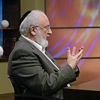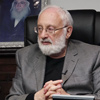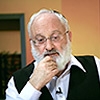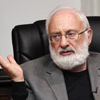Audio Version Of The Blog – 1/13/23
Listen to an Audio Version of the Blog
Download:MP3 Audio

Listen to an Audio Version of the Blog
Download:MP3 Audio

Michael Laitman, On The Times of Israel: “Attendance Is Mandatory”
“Attendance Is Mandatory” may sound like the beginning of a post about school attendance, but it is not; it is a post about compulsory indoctrination at universities in Israel. On Sunday, at an academic convention at Haifa University, Israel, a new book was presented: Islam Is the Solution. The author of the book is none other than Abdullah Nimar Darwish, who founded the Islamic Movement in Israel, was convicted of terrorism, and served jail time in Israeli prison. One of the university professors declared that the status of the lecture is “attendance is mandatory,” and demanded that the students participate actively in this “important discussion.”
The university’s formal explanation was that the lecture is an academic event in every sense of the word. Despite the fact that the book and the lecture present terrorists as victims and Israelis, not Israeli soldiers, but all Israelis, as abusive oppressors, the university declared that it is tantamount to any other reading material.
Could the situation have been the reverse? Could a Zionist activist, convicted of terrorism against Palestinians, be invited to speak at Birzeit University near Ramallah (the administrative capital of the Palestinian Authority)? Never in a million years, and rightly so; it makes no sense to invite an avowed enemy to speak to young people in your country and influence their pliable minds.
All over the world, universities determine their agendas according to their donors’ identity. When their prime donors are anti-Israel, such as the case with many universities in the US and the UK, the schools’ curricula reflect this view. But in Israel, where universities are heavily subsidized by the Israeli government, promoting an anti-Israel agenda simply makes no sense. I understand that in this way, these academic institutions are trying to show the world that they are democratic and offer equal opportunities to everyone, but I do not think that endorsing explicitly anti-Israel speakers is appropriate.
I am all for freedom of expression, and I think there should be no oppression of any person or opinion. However, academia should be a place where people learn skills and professions, not where they are brainwashed.
I am not saying that it is easy to teach history, civics, philosophy, and other courses in humanities, liberal arts, and social science without exposing one’s political leaning, but this should certainly be the goal. This should be the official policy of the state, the official policy of the university, certainly with state-funded universities, and professors and lecturers should aspire to abide by it, with the help of rigorous monitoring by university staff. The fact that today’s lecturers and today’s curricula are far more politically biased, in some cases even blatantly so, means that politicizing a course is a trend, and trends can be reversed.
There is, however, one subject that should be taught without any restraints or fetters: connection and mutual care among people. The world we see today reflects the tensions and enmities that pervade society. The reason so much of today’s schooling is political is that the aspiration to enforce one’s view on all of society has intensified in everyone, making previously non-political discussions heated and hate-filled disputes over governance and government, where each side believes that the other side is not only wrong, but that its view is an existential threat and should be treated as such.
As a counterweight to this trend, we must teach—and this is the most important lesson all of us should learn if we want to survive—that we have no other choice but to learn to care about each other. Israel is not the United States. If we are not united, we will not survive. If we are united, we will have no enemies. In my opinion, “Unity First” should be a mandatory course in every faculty, discipline, and major in academia.
[307775]

Michael Laitman, On The Times of Israel: “The Heat between Us Melts the Ice”
A study published in the journal Science and quoted in Time and elsewhere states that the world’s glaciers are shrinking and disappearing faster than scientists thought, with two-thirds of them projected to melt out of existence by the end of the century at current climate change trends. We can slow down the thaw “if the world can limit future warming to just a few more tenths of a degree and fulfill international goals,” say the authors of the study, but even they admit that it is “technically possible but unlikely.” In other words, humanity, again, is the problem.
Scientists have been warning about melting icebergs for decades, but so far, we have been reluctant to do what it takes to stop it. Everyone knows what to do in order to slow down the melting, but the profit that governments and powerful corporations make from industries that accelerate global warming are too big of a bait to resist.
The rising sea level, by the way, is only one of the dangers lurking in the melting icebergs. A potentially worse problem is the release of viruses and bacteria that are currently kept dormant under the ice, but will awaken once the ice is gone and the temperature rises. This process is already underway, but so far, according to scientists, we have been lucky and no serious pathogens have been discovered in the melting permafrost.
Another problem is the release of methane gas, which is currently locked in the frozen lands of Siberia and Alaska. The methane is already being emitted into the atmosphere as the ice is melting and its impact is accumulative.
Regrettably, as scientists fear, we are unable to make the necessary changes, even though they are recognized and workable. At the current level of antagonism that saturates every faction of human society, there is no chance that companies or governments will do anything for the sake of humanity unless it serves their own interests.
Melting glaciers is far from being the only problem that threatens humanity. War, pollution, inflation, oppression, slavery, hunger, depression, substance abuse, pandemics, extreme climate events, from severe droughts to extreme storms, is there one problem that does not stem from humanity’s concentration only on its own interests? It makes no difference who does the harm, since in the end, everyone is a culprit: Every person on the planet participates in depleting, polluting, and exploiting the soil, water, air, animals, and people. The more powerful the person or the institution, the more exploitative they are, but the trend is the same everywhere and for all people.
Therefore, the solution must be comprehensive and address the root of the problem rather than each symptom separately. Focusing on one crisis at a time, be it climate change or deforestation, or war, or hunger, or water pollution, or any other problem—will only exacerbate the problems rather than alleviate them, since it will distract us from the root cause and its only possible solution: changing our attitude to one another and to our surroundings, in that order.
We must teach ourselves to care for one another. Since this is very difficult to do, since we do not want to care for one another, we must teach ourselves about our mutual dependence—that if we hurt others, it hurts us.
Also, because we are all culprits, we must teach this everywhere and to everyone, without exception.
Once we establish mutual care, it will be easier to facilitate a workable and successful policy and follow it. Our awareness that we are obligated to follow it if we ourselves do not want to be hurt will make us abide by the regulations that will facilitate a difference in human society and in our relation to the planet as a whole.
[307737]
 Any light that expands from Him instantly consists of two discernments: The first discernment is the expanding light itself, before the form of “desire to enjoy” appears in it. The second discernment is after the form of “desire to enjoy” appears in it, at which time it becomes coarser and somewhat darker due to the acquisition of disparity of form (Baal HaSulam, The Study of the Ten Sefirot, Part 1, “Inner Observation,” Chapter 6, Item 24).
Any light that expands from Him instantly consists of two discernments: The first discernment is the expanding light itself, before the form of “desire to enjoy” appears in it. The second discernment is after the form of “desire to enjoy” appears in it, at which time it becomes coarser and somewhat darker due to the acquisition of disparity of form (Baal HaSulam, The Study of the Ten Sefirot, Part 1, “Inner Observation,” Chapter 6, Item 24).
Aviut is what distinguishes the creation from the Creator. Creation feels its difference from the Creator; this quality is called Aviut, that is, something that obscures the light of the Creator and feels the difference from Him.
In our world, this is manifested as the coarseness of desire. There are desires that are coarser or purer. The gradation of these desires is called Aviut.
[307537]
From KabTV’s “The Study of the Ten Sefirot (TES)” 1/1/23
Related Material:
Kabbalistic Terms: “Aviut”
Correction: The Beginning Of The Final Stage
How To Receive In Order To Bestow
 The history of the world can be viewed either as earthly or as one that unfolds in our growing egoistic desire.
The history of the world can be viewed either as earthly or as one that unfolds in our growing egoistic desire.
I see it in front of me supposedly on a deep, three-dimensional spherical screen called this world. Inside it and around me, I am watch the cinema, which is live, and I participate in it. But in fact, it is inside me, in my desire.
Our whole world is my desires, my projection, I just see it from the outside and not inside myself. It does not matter if it is outside or inside, but all this is me.
However, the fallacy of my perception must be put aside because I divide the entire universe into myself and outside myself because this is how my egoism perceives this picture so far. And when I remove my ego, I will find that all this is only my “I,” and I will feel everything inside myself and not outside of myself.
We are talking about egoism, which developed from the Big Bang to inanimate, vegetative, and animate nature.
Human nature manifested itself, supposedly, 50,000 BCE, and up to 5,000 BCE, a primitive communal society developed, in which everyone was equal and everyone had the same possessions.
First, desires that worked on an inanimate level developed, and in the 5th century CE, desires for wealth appeared. This period was marked with a very rapid development of humanity, the appearance of the first technologies, and so on.
From the 5th century BCE to the 15th century CE, until the end of the Middle Ages, there had been a period of striving for power. And along with the Renaissance, great discoveries, printing, and other achievements, the period of development of sciences, the era of enlightenment began, which lasted until the end of the 20th century.
The current 21st century and beyond is already a completely new period that goes beyond the limits of nature to a higher level—the level of similarity to the Creator. However, we cannot handle it. For the first time in our history, we find ourselves completely ignorant of what is happening to us.
There are many different opinions and theories. We realize that none of them tell us anything. But by the development of nature, we can guess that it requires from us integrity, unity, and realization of the biblical principle “love your neighbor.”
[307267]
From KabTV’s “I Got a Call. The Real History of the World” 1/21/12
Related Material:
World History In The Light Of Kabbalah, Part 2
History Of Humanity – A Look Inside, Part 1
History Is the Unraveling of Reshimot Inside Us
 Comment: There is a notion in the classification of cults that if you begin to doubt the teachings of the group because the promised success does not come, then you should always blame yourself since you supposedly do not work on yourself enough or have little faith.
Comment: There is a notion in the classification of cults that if you begin to doubt the teachings of the group because the promised success does not come, then you should always blame yourself since you supposedly do not work on yourself enough or have little faith.
My Response: Yes, this really is so. Why not if everything depends on you? Everything that we study, we take from true Kabbalistic sources. In accordance with the recommendations of Kabbalists, we form a group, activities, daily routine, way of life, and dissemination.
If people have some claims against us, then let them turn to these sources and begin to criticize them. I can tell them where all this is written. Literally against each of their accusations or statements, I can show what is written in the Kabbalistic books. We are just trying to follow these instructions.
So, their claims are not against me, but against our sources, against those great Kabbalists who attained the upper world, described it, and gave us the entire Kabbalah, the entire Torah. Because the Torah is the outer part of Kabbalah. And Kabbalah is the inner part of the Torah. Therefore, Kabbalah is called: Torat Emet – True Torah.
This means that they have a problem not with us, not with me, and, in general, not with the group, but the problem of self-identification, with understanding who they are. In fact, they exist in this world in order to advance themselves somewhere, correct, find the source of life, the purpose of creation, and go toward it.
I do not think my answers about the difference between Kabbalah and a cult will help someone, because people opposed to us are obliged to prove to themselves that they are right. Time will convince them differently, or rather the blows of fate. We are approaching this. That is why it is said: “What the mind does not do, time does.” The same will happen to them.
[307213]
From KabTV’s “I Got a Call. Kabbalah about Cults” 12/18/13
Related Material:
For Peace and Friendship
Antagonism Toward Kabbalah
Kabbalah Is an Integral Science
 In the end, our relationship deteriorated to such an extent there was only one thing left: to agree that we respect each other extremely (George Bernard Shaw).
In the end, our relationship deteriorated to such an extent there was only one thing left: to agree that we respect each other extremely (George Bernard Shaw).
My Response: Yes. 🙂 That is all that is left.
Question: How is it possible to bring a relationship to this point and not to blow up, break up, or destroy it, but arrive at mutual respect and the ability to communicate?
Answer: “We respect each other”; that is, we know for sure that we should not stab each other nor get too close, but respect each other at a distance.
Question: Is this called rising above hatred?
Answer: We rise above it; we take our relationship into account. And we understand that we cannot achieve much more for now. But gradually, of course, everything can come back again.
Question: What can we do so that we do not let it happen again? We have a bad relationship, we hate each other. But here it says: “We need to sit down and start respecting each other.”
Answer: Break up and gradually start getting closer, this is what everyone generally advises. But get closer gradually so that I clearly understand the boundaries and so does my partner.
I have to see that they are not trying to hurt me, and I have to show how much I am trying not to hurt them. And then, as we start getting closer, we will feel how close we should get. This depends on inner sensitivity.
Question: Is this a necessary path toward further closeness?
Answer: Of course.
Question: What is achieved as a result? Do we connect somewhat or not?
Answer: We can connect in a way that will be even better than with those we had a good relationship with.
Question: So, from such hatred we can come to such closeness?
Answer: Yes.
Question: Is this how it happens that from the greatest hatred people come to the greatest closeness?
Answer: That is how it usually goes.
Question: So this is the most important way: break up and start slowly getting closer?
Answer: Yes, it is highly advisable. The whole ancient political superstructure, program, and politics were always conducted this way.
Question: Why do we not hear much about it today?
Answer: We have weapons. That is, everything has been replaced. It used to be that I have a saber and you have a saber; I have a spear and you have a spear; horses here, horses there. But today, it is all about the number of planes, tanks, missiles, and everything else; therefore, there is nothing to negotiate about.
Question: How can the world come to such everyday simple wisdom? You have just spoken not of higher wisdom, but of our earthly wisdom. Or is it still higher wisdom to operate this way?
Answer: The world has no ideals today. Humanity has no respect for anyone. If before it was the Pope or a special king or someone else, today there is not.
Question: Why are there no ideals left?
Answer: Because force replaces all other considerations.
Question: So, it becomes an ideal for me to be strong?
Answer: Yes, I have a bomb in my pocket and that’s it.
Question: Why is that? We talk all the time about the upper providence, the upper force. Why would it bring the world to such emptiness?
Answer: So that we understand we truly do not have anything at all. We are faced with the need for some real ideals in order to judge and compare ourselves with. In the meantime, there is none of this.
Question: What is, in fact, an ideal?
Answer: In fact, the ideal is, I would say love.
In the age of nuclear power when we can break everything and leave nothing, love is the opposite of it. What else can you do? Nothing. If we could beat each other up and then make up, that is another story. But when we are on the verge of a nuclear conflict, there can only be the opposite of it—love.
That is why I believe, in our days, there is an opportunity to come to such a state, to such a rapprochement called love. Because there is no other way.
In our time, peace is possible for the first time in many millennia! Because I have all sorts of nuclear weapons and so do you. Thus, there is nothing left to do but to put it aside and try to get closer to each other in order to find the benefit.
Question: You have one simple answer: live based on love?
Answer: Yes. As Longfellow, an American poet of the 19th century wrote: “Bury your war clubs and your weapons… Smoke the calumet together and as brothers live henceforward!” That is what you need.
[306319]
From KabTV’s “News with Dr. Michael Laitman” 9/29/22
Related Material:
Next Year Will Be a Turning Point
What Is Happening In The World?
A New Stage in Human Development
 We are in a state where, after successive exile from Babylon, Egypt, and Persia, we are figuring out the conditions for the ascent to the last degree, meaning the way out of the current global crisis of all mankind.
We are in a state where, after successive exile from Babylon, Egypt, and Persia, we are figuring out the conditions for the ascent to the last degree, meaning the way out of the current global crisis of all mankind.
Now modern global plagues are manifesting in front of all mankind. They have not yet fully manifested, but we are already beginning to be a little aware of them and we feel their approach. Threatening “tsunamis” are coming at us. People are beginning to understand what Pandora’s Box they have opened with their insane, thoughtless egoistic actions.
Today we must put the methodology of Kabbalah into action. I am happy that I have something to do with this, and I can reveal and explain to people what we are obliged to do, what state we are in, what kind of world this is, and what opportunities we have.
I am glad that we can discover this technique within ourselves, like in a laboratory, and then present it to the whole world, show that it is effective, show how to work practically, become an example for all mankind, and return it to a state of upper force, meaning, to the quality of bestowal and love in a kind, quick way, as soon as it’s possible.
[307416]
From KabTV’s “I Got a Call. History of the Jewish People” 5/4/14
Related Material:
Rabash: Disseminating Kabbalah
The Eternal Task of the Kabbalist
Can We Offer The Wisdom Of Kabbalah To Everyone?
 Comment: Criticism from the outside is considered an additional proof of the righteousness of the group is purported to be a defining factor of cults.
Comment: Criticism from the outside is considered an additional proof of the righteousness of the group is purported to be a defining factor of cults.
My Response: I do not think this is correct. Criticism from the outside is the natural criticism of people who do not understand what we are dealing with.
I think that we should not pay attention to criticism. Personally, it does not put me out of temper and does not set me against the critic. I do not disrespect him. There are even philosophers who come out against me. I do not perceive their words as criticism at all.
You can criticize when you understand the subject, when you have a clear opinion about it from the point of view of the knowledge of this subject. What if they do not know it? That is, they themselves have not attained it. Even so there are disputes among Kabbalists because this is science and this is the disclosure of a certain part of the universe—gradual, stepwise, to a bigger and bigger extent. There are Kabbalists who have revealed more and those who have revealed less, like scientists in our world.
Therefore there is discrepancy among them, disputes, and so on. I do understand this. There are some very interesting fights going on there. There are entire books devoted to how each of them perceives the unfolding universe and why. But they discuss it pointedly. Why do I perceive things differently from you? What is the problem? Why are we built in the way that we perceive the same thing differently?
There are different types of souls. Some of them relate to direct light, others to surrounding light, and so on. And it is precisely in their clash, in the process of clarification, that an even greater elevation of both of them takes place. They zealously argue among themselves, but these are people who are in the same attainment, in the same world, they have what to talk about, they understand each other, and their clarifications are very serious.
And what is there to talk about here? If I am reading a novel and crying, or watching a movie on TV and laughing, and a cat is sitting next to me, how can he participate in this? Not in any way. He is only moving his ear toward the sounds I am making and thinking: “What is the matter with the master? I wish he would sit quietly and doze.”
It’s the same with those who criticize. You irritate them with your studies of Kabbalah. They feel that there is something in you that you can explain everything and that your predictions come true, although you are not a fortune teller. Long before the crisis I said that it would come. And when it started I said that it would not end. But they shouted: “The crisis will be over in a year or two.” And now they are silent and do not contradict me.
But who is pleased when you predict such bad events? Moreover, nothing will change because of your predictions.
Everything can change only due to our intensified dissemination, and there is no point in just talking. There will be still more critics. Still more people will slander us, that we, so to say, hate everyone because we are talking badly about the future when we say: “We ourselves are to blame for what is happening.” And so on.
That is, people will of course defend themselves; this is their natural reaction. That is life.
[306841]
From KabTV’s “I Got a Call. Kabbalah about Cults” 12/18/13
Related Material:
Fanaticism or Attainment?
Love of Friends in Bnei Baruch
Why Did I Write About Rav Berg and the Kabbalah Center On This Blog?
 Michael Laitman, On Quora: “How do we build an image of other people inside us?“
Michael Laitman, On Quora: “How do we build an image of other people inside us?“
We are emotional cameras because we picture other people in our emotions, which are in our desire to receive.
The desire to receive pleasure is our nature and it makes us perceive everyone and everything via how we can enjoy from them.
For instance, if we look at another person’s face, we might register only their eyes and their smile, because we might enjoy those facial features the most. We do not acquire an exact physical photograph of the other person, like how police piece together facial composites, but we build an emotional impression based primarily on what we enjoy from the other person and their features.
Other than people, we also perceive animals, plants and objects similarly—in the desire to receive pleasure, which is ultimately what we are and where we perceive our reality.

Based on the video “How You Create an Image of Other People Within” with Kabbalist Dr. Michael Laitman, Tal Mandelbaum and Oren Levi. Written/edited by students of Kabbalist Dr. Michael Laitman.